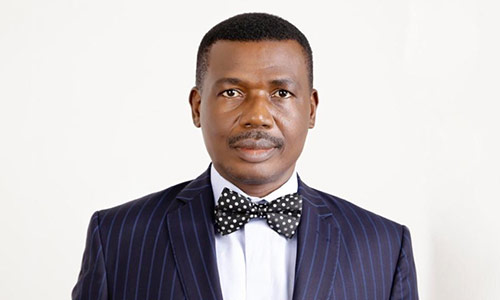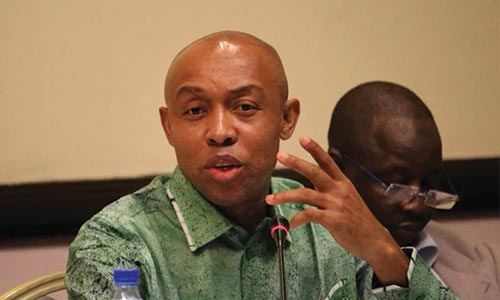Role Of The Judiciary In The Development Of Democracy

By Ebun-Olu Adegboruwa
Last week I was a guest speaker at the reception organized by distinguished members of Ilaje Forum for the newly-appointed Chief Judge of Ondo State, The Honourable Justice Olusegun Odusola. It was a gathering of notable personalities cutting across the executive, the judiciary and the legislature so it gave me the good opportunity to speak on the role of the judiciary. Permit me to share the text of my paper with you.
INTRODUCTION
I want to specially recognize the presence of the Executive Governor of Ondo State, the Deputy Governor of Ondo State, the Speaker of the House of Assembly, the principal members, Commissioners, Judges, members of the Inner and Outer Bars, our Royal Fathers present, gentlemen of the press, invited guests, distinguished ladies and gentlemen. Nothing gladdens the heart more than when a prophet is honoured by his own people in his lifetime. Ilaje Forum has been at the forefront of celebrating the modest achievements of sons and daughters of Ilaje who have excelled in their various fields of endeavour. As a beneficiary of this kind gesture just a few years back upon my elevation into the Inner Bar, I consider it a rare privilege to be counted worthy to make this presentation at this august gathering.
As a true worshipper in the temple of justice and a firm believer in democracy, good governance and the rule of law I am very elated to be given the opportunity to make a few remarks in the gathering of key players and institutions relevant to our nascent but fast-growing democracy. Democracy, which today is simply defined by Abraham Lincoln as “the government of the people, by the people and for the people’’, gives the people the free will to choose who governs them and makes laws that bind them. In our own setting, this is aptly captured under section 14 (2) (a) of the 1999 Constitution which states that “sovereignty belongs to the people of Nigeria from whom government through this Constitution derives all its powers and authority.” Thus, the people in a democracy are the ultimate power brokers and power wielders, they are like the wheel in a moving vehicle- they make and act through their representatives and whenever there is disagreement, the Judiciary is usually called upon to do justice and settle the disputes between the parties amicably. Democracy which started from ancient Athens in Greece kicks holistically against oligarchy, autocracy, totalitarianism and anything oppressive in government. Speaking further on the concept of democracy, Abraham Lincoln summarizes his views on democracy thus:
“As I would not be a slave, so I would not be a master. This expresses my idea of democracy.”
For the Professor of Government at the University of Essex, UK, Albert Weale, democracy is a system where “important public decisions on questions of law and policy depend, directly or indirectly, upon public opinion formally expressed by citizens of the community, the vast bulk of whom have equal political rights.” A common trend that runs through the definitions and conceptualization of the concept of democracy is that democracy is a form of government, that places the people at the centre and in which decisions by elected representatives, must reflect the wishes of the majority of the citizens. Put more succinctly, a society is said to practice democracy where the following tenets exist in their practice to wit:
(i) Popular Sovereignty/Protection of minorities
(ii) Limited Government
(iii) Rule of law/Due process of law
(iv) Protection of fundamental rights
(vi) Separation/Independence of the arms of governments
(vii) Quick, efficient and fair Dispensation of Retributive, Corrective and Procedural justice.
Democracy entails the actual participation of the people in governance and the electoral process. While the people have been regarded as the wheel of democracy, the judiciary has been tagged as the grease in that wheel. The judiciary is like the watchdog. In a democracy like ours, the constitution provides for three arms of government, namely: the executive arm, legislative arm and the judicial arm. It is worthy of note that only the judicial arm is a professional organ which is made up of members of the Bench- these respected members of the Bench are saddled with the sacred responsibility of doing justice whenever dispute arises among the other arms of government or between the people and the government they have elected. In this regard it is expected of the judiciary to be highly professional in discharging their duty, they must also ensure that justice is not only done but seen to be actually done. This is because where the public loses faith in the judiciary which is widely known as the last hope of the common man then, there might be pending doom and threat of anarchy in the society. It is worthy of note here that a corrupt judge is worse than an armed robber. As Saint Augustine rightly put it “kingdoms without justice are mere robberies…’ St Augustine (354-430) in book IV of the City of God.
THE JUDICIARY IN NIGERIA
In a constitutional democracy, courts play the role of an arbiter and final protectors of rights. In addition, they advance the democratic culture by ensuring that no one is above the law, and a forum is provided wherein abuse of power can be challenged. The judiciary has the power to make decisions by interpreting and applying the constitution. Constitution interpretation by the judiciary helps in the shaping of government and its processes in a democratic setting. The judiciary which is often regarded as one of the tiers of government has so much in common with democracy. I must say here without equivocation that the judiciary in Nigeria has done substantial justice since independence even in the face of tyranny and an undemocratic military government. In Fawehinmi v Abacha SC 45/1997, (2000) 6 NWLR (Pt.666) 228, the Supreme Court rose to the occasion to ensure rights of Nigeria citizens are protected no matter the government in power. The judiciary in Nigeria has over the years helped to promote human rights and by extension the growth of various trappings of democracy. It has checkmated on the executive rascality and upheld the sanctity required in a democratic state. Just recently the Supreme Court in the case involving the Federal Government v. A.G of Kaduna State and Others assumed original jurisdiction and overturned the unpopular policy of the executive arm on the naira redesigned policy. It is believed that the judiciary acted on the side of the law and on the side of the people. These developments clearly showed that that the Supreme Court is not only a court of law but also a court of public policy- this decision has a far-reaching implication- one of which is that the executive will now be challenged directly by the Supreme Court on any policy that is anti people and done contrary to the law. It is almost impracticable to think of democracy without the judiciary since democratic development and sustenance rest on an independent and fair judiciary.
THE INDEPENDENCE OF THE JUDICIARY
Judicial independence is vital in the promotion of democracy, human rights and rule of law in any democratic society. It must be guaranteed by the Constitution, rather than oscillate according to the whims and caprices of some individual(s). If guaranteed by the Constitution, then, the judges themselves would be called upon to adjudicate whenever there are instances of encroachment on its independence. In other words, the judiciary can, and should be its very guarantor of independence, by construing strictly its power as stipulated in the Constitution and ensuring that such power is exercised without any interference. Such independence lies at the very heart of separation of powers, permitting the judiciary to pass judgments that may transcend political lines but contribute to a culture of democracy, rule of law and human rights. Judicial independence is a core democratic value. Instead of narrowing or limiting its power, the key political actors should consider it a vital tool for the enhancement of a democratic society. When such a role is performed, then, there will be no need to resort to extra-judicial means in the resolution of political disputes. In Nigeria, the 1960, 1963, 1979, 1989 constitutions made provisions for judicial autonomy and roles. The Constitution of the Federal Republic of Nigeria, 1999 (as amended) which is the constitution in practice clearly provides for the establishment of the various arms of the judiciary with their clearly stated roles in all respects.
My Noble Lord The Honourable The Chief Judge, even as we applaud you today for this laudable appointment, I want to also use this opportunity to galvanize the judiciary to enable it to thrive as you have always done. Steer clear from manipulation and intimidation and allow justice to flow. Hold any and every one accountable for breaching the orders and judgments of this judiciary. I believe as a democrat, you will continue to lead by example as you have always done. As autonomy and financial freedom have now been granted to the judiciary, let there be devolution of powers within the judiciary, as for instance, there is no reason why there is no Judicial Division in the entire Ilaje Local Government, where about 80% of the civil cases in Okitipupa High Court emanates from.
In any democratic setting or system, the judiciary is always demonstrated in the courts and this is not different in Nigeria. By Section 6 of the Constitution of the Federal Republic of Nigeria 1999 (as amended) the judicial powers of the Federation and States are vested in the courts; it is therefore the responsibility of the various justices and judges in the various courts to protect and promote democracy by giving decisions that liberate and ensuring justice is not sacrifice in the altar of technicality or caged with the trending phrase of “substantial compliance” especially as relates to political office holders and duties, our electoral laws and processes. Judicial independence has remained a very serious and controversial issue in the process of judicial exercise; hence, several modalities have been developed over the years to safe-guard any influence in judicial decisions by other arms of government.
Life without Christ is Crisis


